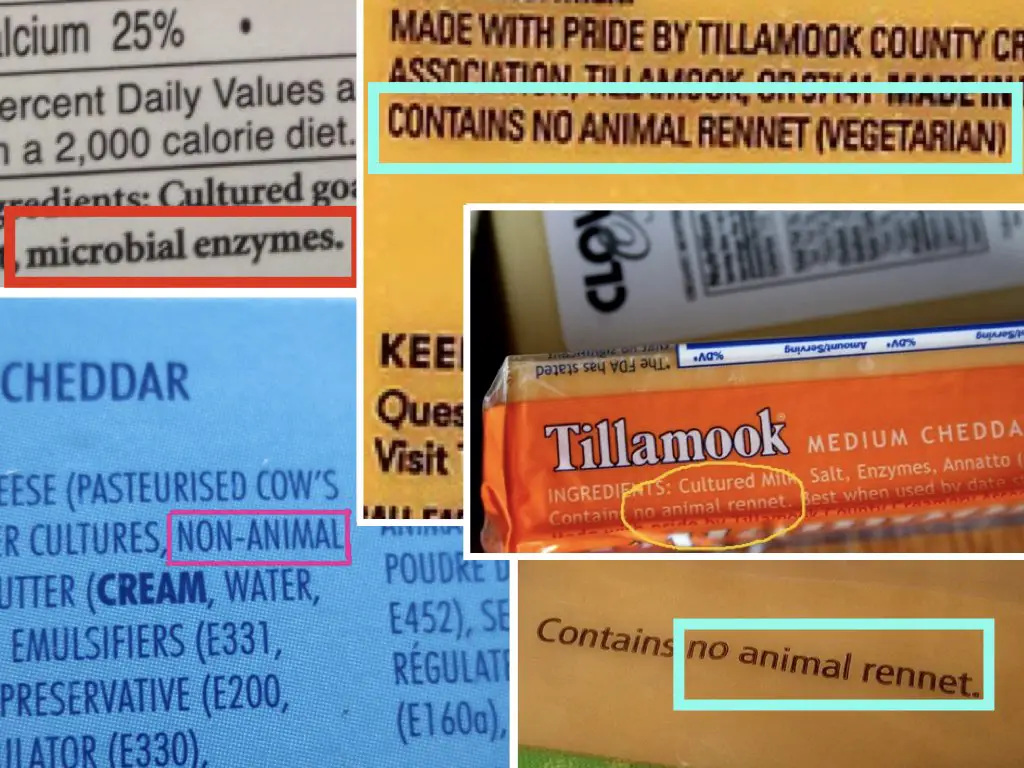Last Updated on December 24, 2022 by Aaron
Surprisingly, the answer to whether cheddar cheese is vegetarian or not is not straightforward. This largely depends on how it was made and what ingredients were used in the manufacturing process. And the key ingredient is — rennet (an enzyme used to curdle the milk).
Traditionally, cheddar uses animal-based rennet, which is derived from the stomach of calves killed for veal, which would not be suitable for vegetarians. Some of the popular artisanal brands that are still using animal rennet in the United States are Jasper Hill Farm and Uplands Cheese.
However, most supermarket cheddars are using microbial rennet made from micro-organisms such as fungi (mold or yeast) or bacteria, making them suitable and acceptable for most plant-based eaters.
Table of Contents
It’s worth noting that most microbial rennet originally came from animal cells, and is usually genetically modified — in particular the GMO-derived enzyme (FPC) used in 80-90% of cheese industry today. This makes it technically non-vegetarian, as it includes animal byproducts. Therefore, it’s usually viewed as “vegetarian-friendly”, which is permitted by lacto- and lacto-ovo-vegetarians, as well as some pescatarians. If you would like to make sure your cheddar cheese is 100% vegetarian, try vegan cheddar — but first, please read our vegan cheddar cheese overview here.
Can Cheddar be Made Without Rennet?
Rennet serves as the key ingredient in making cheddar cheese. It helps coagulate milk, which is an essential part of the process when making cheddar cheese. If a form of rennet is not used, it’s not possible to produce cheddar cheese — regardless of animal or microbial.
Cheese can be made without using rennet, but can’t be technically called a cheddar. It’s possible to use the acid-set method with either bacteria culture (to curd the milk naturally) or adding acids such as vinegar or citric acids. But the taste and texture of the cheese will be different from the cheddar that we used to know.
The more seemingly feasible way to produce the cheddar is to use plant-based or vegetable rennet. It’s a natural coagulant extracted from plants, such as thistle, artichokes, and nettles. But there are downsides as well — cheddar is a longer-aged hard cheese, and vegetable rennet is great for soft cheeses and is not favorable for long aging. It may leave a bitter or weird taste as well. Other than that, plant-based rennet is also inconsistent (less effective) as mentioned by cheesemakers. Therefore, microbial rennet is still the more practical mainstream option for cheddar making.
The Cheddar for Vegetarians
The easy way is to always look for a vegetarian label such as with the “V” or “100% vegetarian” or “Vegan” on their packaging to be safe.
Some brands do a good job of labelling the rennet sources to be animal or plant or microbial on their packaging clearly. But FDA does not require cheesemakers to clarify the rennet, therefore it will often be simply labelled as “enzyme” in the ingredient list. Sometimes it could also be in “microbial rennet”, “non-animal rennet”, “non-animal enzyme”, “FPC enzyme”, “chymosin”, “vegetarian rennet”, “vegetarian enzyme”, and so forth.
These glossary terms are indicators of rennet source and can be used to help identify a product as vegetarian-friendly. Now let’s take a look at some popular brands of cheddar cheese and their respective rennet label on the packaging.
Microbial-Rennet
- Kerrygold Cheddar; Dubliner Cheddar – Enzymes
- Cabot Cheddar Cheese – Enzymes
- Sargento Natural Cheddar – Enzymes
- Cracker Barrel Cheddar – Enzymes
- Sartori Montamoré Cheddar – Enzymes
- Tillamook Cheddar Cheddar – Enzymes
- Beecher’s Flagship Cheddar – Enzymes
- Laclare Farm Raw Goat Milk Cheddar – Enzymes
- 365 Whole Food Market Cheddar – Enzymes
- Happy Belly Cheddar – Enzymes
- Adams Reserve New York Cheddar – Enzymes
- Boar’s Head Yellow Cheddar Cheese – Enzymes
- Crystals Farms Cheddar Cheese – Enzymes
- Dutch Farms Cheddar Cheese – Enzymes
- Great Lakes Cheese Cheddar – Enzymes
- Kroger Sharp Cheddar Cheese – Enzymes
- Yancey’s Fancy Cheddar – Enzymes
- Happy Farms (ALDI) Cheddar – Enzymes
- Kraft Processed Cheddar; Cheddar Block – Microbial Rennet
- Trader Joe’s Cheddar – Microbial Rennet
- Kirkland Signature (Costco) Cheddar – Microbial Enzymes
- Good & Gather (Target) Cheddar – Enzymes [Microbial]
- Vella Cheddar – Non-animal Rennet
Plant- or Vegetable-Rennet
- Old Croc Cheddar – Enzymes (Vegetable Rennet)
- Meyenberg Goat milk cheddar cheese – Vegetable Enzyme
- Wyke Farm Cheese Vintage Cheddar – Vegetarian Rennet
- Organic Valley Raw Sharp Cheddar – Vegetarian Enzyme
- West Minster Cheddar – Vegetarian Rennet
- Murray’s Irish Cheddar – Vegetarian Rennet
- Murray’s High Plains Cheddar – Vegetarian Rennet
- Applegate Cheddar – Made with vegetable rennet
What About Cheddar Snacks — Vegetarian?
Depending on the cheddar use, many cheddar snacks are suitable for vegetarians. Some popular brands such as Cheez-It, Lays Cheddar and Sour Cream chips, Doritos Cheddar Jalapeno chips, Goldfish crackers, and Annie’s Organic Baked Crackers use “enzymes” and “non-animal enzymes” of cheddar cheese in their product.
For example, The Cheddar Goldfish by Pepperidge Farm is using “enzymes” bracketed next to “cheddar cheese” in the ingredient list, which is commonly FPC enzymes — a microbial rennet.
Reference:

